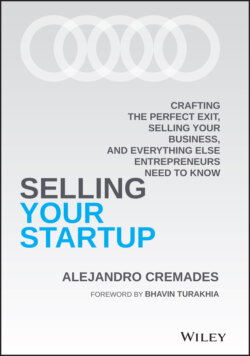Читать книгу Selling Your Startup - Alejandro Cremades - Страница 13
Media versus Your Business: What You See in the Press versus Reality
ОглавлениеJust as with fundraising, there can be a big difference between the average merger and acquisition and the sensational headlines you see in the media.
After interviewing hundreds of real-world entrepreneurs on the DealMakers podcast—entrepreneurs who have raised amazing money and exited their companies for the grandest outcomes—I've gained and shared the inside scoop on many big deals.
There are certainly startups that have attracted amazing inbound offers in just a year or two since launching. Some have been incredibly fortunate to have found highly competent and efficient acquirers who have run smooth and fast processes. More than a few have sold their companies for billions of dollars.
Others appear to be “overnight successes” after 10 years or more of hard work. Some end up exiting their companies in less-than-ideal circumstances and for much less than expected.
Sometimes board members sabotage the ideal moments to sell for the most dollars. Although exits can happen in only a few weeks, they can often take a year to complete—a long period of extra hustle and stress, which few people talk about.
And although most founders strive for an exit that creates a great future for their startup baby, customers, product, and team, it isn't always as glamorous and profitable as expected. Companies that choose the IPO route often find things go downhill fast in the 12 months after going public. Reverse mergers to take back and revive a company aren't all that uncommon.
If things haven't been structured well for you up to this point, it can lead to huge shortfalls. Did you know that you can sell your company for $1 billion and end up walking away with almost nothing? Due to earnings multiples, seniority, and liquidation preferences, companies appearing to have a lot of equity can leave founders and employees with very little stock at the closing.
When the startup Get Satisfaction sold for $50 million, the founder said he didn't get a penny. The startup Good Technology was valued at $1.1 billion. When the company sold, some employees paid six figures in taxes on their supposed equity, then saw the values of their shares fall from $4.32 to just $0.44.
Even in some of the best scenarios, vesting and resting clauses may mean that you only get half of the announced sale price if you can't stick out the next few years working for your acquirer and hitting the high goals they have set.
The point is, unless you are very careful in structuring equity and legal agreements during the journey, and you understand what they mean in a given exit, those big headlines may not make you feel that good in reality. Sure, the gold star for your résumé might make starting a new venture and raising new money easier, but you should ensure you are getting paid well for all of the sacrifice and work you are putting in.
I often share with entrepreneurs the importance of looking after the founder exit as opposed to just thinking about the business exit. Founders should always keep an eye on the ball. It is all about finding an outcome that justifies all the sweat and tears shed over the course of time.
